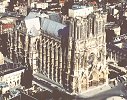Whether we "like" art from the past or whether we agree with the ideas it suggests, it tells us about human needs, desires, fears, and the positive accomplishments of human kind. (History is not just about wars and human evil and destruction, after all!) As you look at art both in class and here, think about what it tells you about our human needs and aesthetic sense.
We also look at the arts because they have often infuenced our culture. We have inherited a long artistic past. The U.S. Supreme Court building in Washington copies temples from Ancient Greece. The National Cathedral in Washington copies cathedrals of medieval Europe. As you browse this web site, begin to think about what we have inherited from the past, what we have rejected -- and why.
Finally, we look at the art because it often reveals the values of a civilization. Architecture, because it is expensive and time-consuming to construct, is particularly revealing. Some civilizations have built temples or churches, others palaces or castles, others have built both. Some civilizations have built practical structures like roads. Our culture has built skyscrapers -- are they temples to commerce? -- and shopping malls with huge parking lots -- temples to consumption and cars? As you look at art, think about what it tells you about the values of the culture that produced it.

Text and image preparation by Mary Ann Sullivan. Design by Gerald W. Schlabach.
All images marked MAS were photographed on location by Mary Ann Sullivan. All other images were scanned from other sources or downloaded from the World Wide Web; they are posted on this password-protected site for educational purposes, at Bluffton College only, under the "fair use" clause of U.S. copyright law.
Page maintained by Gerald W. Schlabach, gws@bluffton.edu. Last updated: 21 November 1997.

